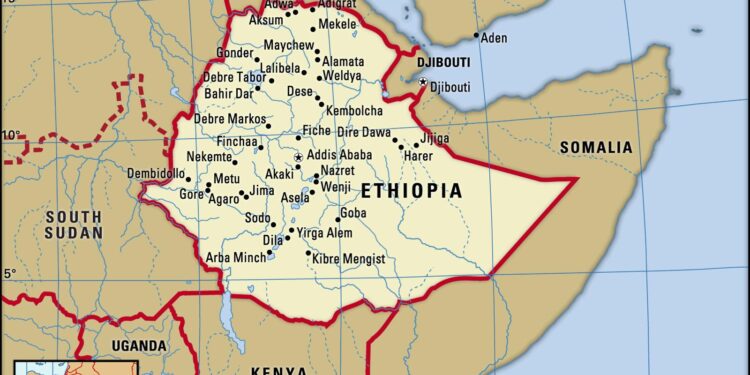In a significant diplomatic development, leaders from Ethiopia and Eritrea have signed a groundbreaking accord in Saudi Arabia, signaling a new chapter in their historically tense relations. This agreement, reached during a high-profile meeting facilitated by Saudi officials, aims to address longstanding grievances and promote regional stability in the Horn of Africa. The accord, which includes provisions for enhanced cooperation on various fronts, marks a hopeful step towards peace and collaboration between the two neighboring nations. As both countries navigate the complexities of their shared history, the implications of this agreement could resonate across the region and beyond, presenting opportunities for economic growth and improved diplomatic ties.
Ethiopian and Eritrean Leaders Forge Historic Accord in Saudi Arabia
In a remarkable display of diplomacy, Ethiopian Prime Minister Abiy Ahmed and Eritrean President Isaias Afwerki signed a historic accord in Saudi Arabia, signifying a renewed commitment to peace and collaboration between the neighboring nations. This landmark agreement aims to foster stability and economic development within the Horn of Africa, a region long marred by conflict. Key objectives outlined in the accord include:
- Enhanced Diplomatic Relations: Establishing formal channels for regular dialogue and cooperation.
- Economic Partnerships: Promoting trade agreements and joint investments to boost bilateral economies.
- Security Cooperation: Combating shared threats such as terrorism and organized crime.
This agreement, facilitated by Saudi Arabia, marks a significant turning point in the decades-long tensions that have characterized the relationship between Ethiopia and Eritrea. The leaders expressed optimism about the potential for greater stability, with both nations poised to benefit from increased mutual trust and collaboration. Furthermore, a special committee will be established to oversee the implementation of the accord, ensuring that the commitments made translate into actionable steps. The accord has garnered international support, emphasizing the importance of peaceful resolutions in a volatile region.
| Factor | Ethiopia | Eritrea |
|---|---|---|
| Population | 114 million | 3.5 million |
| Capital | Addis Ababa | Asmara |
| GDP Growth Rate (2022) | 3.8% | 4.7% |
Implications for Regional Stability and Cooperation in the Horn of Africa
The recent accord between the leaders of Ethiopia and Eritrea, orchestrated in Saudi Arabia, marks a pivotal moment for regional stability within the Horn of Africa. This agreement has the potential to reshape the geopolitical landscape, fostering an environment of cooperation that has been historically absent. By prioritizing dialogue over conflict, both nations are taking significant steps toward reconciliation, with implications not only for bilateral ties but also for neighboring states. Key outcomes of this agreement may include:
- Enhanced diplomatic relations aimed at resolving long-standing grievances.
- Increased economic collaboration, potentially leading to shared infrastructure projects.
- Stabilization of border areas, reducing insecurity and regional tensions.
As the Horn of Africa grapples with myriad challenges—ranging from political instability to economic hardships—the collaboration initiated by Ethiopia and Eritrea could serve as a catalyst for broader regional cooperation. Other countries within the region, such as Djibouti and Somalia, may also feel the impact of this renewed relationship, prompting them to seek closer ties and collective strategies for peacebuilding. The ripple effects of this accord might include:
| Country | Potential Benefits |
|---|---|
| Djibouti | Strengthened trade routes; enhanced maritime security. |
| Somalia | Opportunities for collaborative security initiatives; support for recovery efforts. |
| Sudan | Access to new markets; reduction in regional instability. |
Strategic Recommendations for Sustained Peace and Development Initiatives
As Ethiopian and Eritrean leaders engage in their landmark agreement, it is crucial to implement strategic initiatives for lasting peace and development in the region. Building on their recent accord, both nations should prioritize diplomatic engagement by fostering ongoing dialogue through regular summits and joint task forces. This approach will help address unresolved issues and reinforce commitment to the peace process. Additionally, establishing economic cooperation can facilitate trade partnerships, aiming for joint investments in sectors such as infrastructure, agriculture, and technology. The focus on mutual prosperity will not only enhance economic stability but also strengthen bilateral relations.
Moreover, reinforcing social cohesion among the communities is essential for a peaceful coexistence. Initiatives that promote cultural exchange and community-based programs can pave the way for improved understanding and collaboration between different ethnic groups. In this regard, both governments should consider setting up educational partnerships that encourage cross-border exchanges, enhancing the skills and capacities of their populations. Furthermore, a joint security framework can be developed to address regional threats, ensuring both nations collaborate effectively against common challenges. Sustainable peace and development hinge on a comprehensive approach that engages all stakeholders in both countries and beyond.
To Conclude
In conclusion, the landmark accord signed between the leaders of Ethiopia and Eritrea in Saudi Arabia marks a significant milestone in the complex relationship between the two nations. This agreement not only embodies a commitment to foster peace and collaboration but also highlights the vital role regional powers can play in mediating lasting solutions to long-standing conflicts. As the two countries embark on a new chapter of bilateral relations, the international community will be watching closely to see how this pact unfolds and its potential to enhance stability in the Horn of Africa. Continued engagement and dialogue will be essential to ensure that this initial step leads to meaningful progress for the people of Ethiopia and Eritrea.














